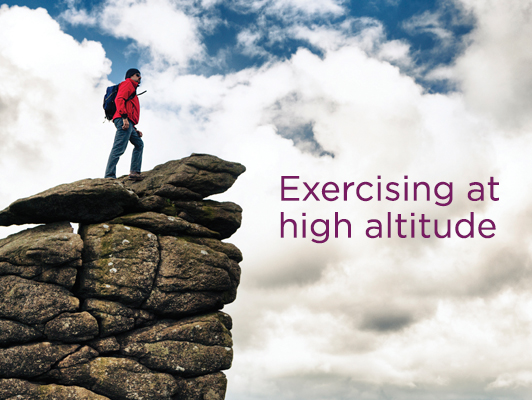Exercising at High Altitude

Whether you are on a business trip and looking to work out, running a marathon, or going on a skiing vacation to high altitude, you should take special precautions to avoid becoming sick or injured at altitude. At high altitude your body needs to work extra hard to take in the same amount of oxygen as you are accustomed to at sea level. Oxygen levels at higher altitudes (above 5,000 feet) are a lot lower than they are at sea level, which will cause your breathing rate to increase and will cause you to become tired much more easily. To learn about high altitude sickness and what symptoms to watch out for, check out our blog post.
Upon Arriving
One of the most important precautions to take when traveling to a higher altitude is avoiding any strenuous activities or workouts the first day of arriving. Your body will need time to adjust to the oxygen levels, and pushing your body too hard right away can cause a lot of health problems. Upon arriving, make sure to stay hydrated at all times, so it is definitely recommended to carry a water bottle around with you, even if you are just going for a walk.
High Altitude Training
Once you feel that you have acclimated to the higher altitudes, it is still recommended to start your training off very slowly and work your way up to your normal training levels. Easing into your workouts will allow your body to acclimate to the environment and lessen the chance of any altitude-related illness. If you are looking to go for a run, start off walking and then slowly jogging at about half your normal running pace and see how you are feeling before trying to push any further. You may need a couple days in order to slowly build up to what you consider your normal activity level. The amount of time this takes will vary from one person to the next, and even professional athletes have to take time to adjust before competing or training at higher altitudes.
Other precautions to take are to drink more water than you normally would during a workout until you adjust to the altitude and making sure to apply sunscreen if you are going to be training outdoors; even in the winter months it is still important to do so. Also make sure to eat a healthy snack with complex carbs to be used as energy before exercising. Since your body will be working harder than normal, this becomes very important.



